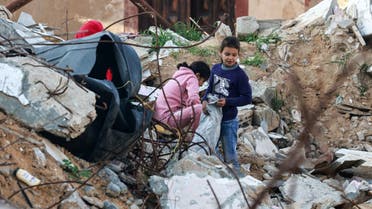GAZA STRIPS (AFP) : Shelling and missile strikes rocked the length of the Gaza Strip overnight into Tuesday, after Israel’s army warned its war on the territory will last through 2024.
Nearly three months of conflict have claimed almost 22,000 lives in Gaza, according to the health ministry, and devastated much of the besieged territory.
Despite relentless global demands for a ceasefire, military spokesman Daniel Hagari said Monday the army was preparing for “prolonged fighting” expected to last “throughout this year.”
On Monday night into Tuesday morning, eyewitnesses reported missiles fired towards the city of Rafah in the south and shelling around the Jabalia refugee camp in the north.
Fighting was also reported around the central areas of Maghazi and Bureij, as well as the main southern city of Khan Younis.
“It’s the worst year of our lives,” Gaza resident Sami Hamouda, 64, told AFP of 2023.
“Every new day is like the previous one: bombings, death and mass killings.”
The war was triggered by Hamas’s October 7 attacks on Israel, which resulted in the deaths of around 1,140 people, most of them civilians, according to an AFP tally based on official figures.
The militants also took around 250 people hostage that day, more than half of whom remain in Gaza, according to Israeli officials.
Israel has vowed to destroy Hamas in retaliation for the militant group’s October 7 attack.
The Israeli army launched an offensive that has reduced vast areas of Gaza to a ruined wasteland and killed at least 21,978 people, mostly women and children, according to the territory’s health ministry.
‘Hopeless’ conditions
Witnesses in northern Gaza told AFP on Monday that they had seen Israeli forces leaving several areas in and around Gaza City, likely suggesting redeployment rather than permanent withdrawal.
Hagari said the Israeli army was “adapting the planning of the force deployment in Gaza”, including for reserve soldiers, as “the fighting will continue and they will still be required”.
Israeli Defense Minister Yoav Gallant, meanwhile, said residents of some towns and villages near the Gaza border – many of which have been evacuated since the October 7 attacks – “will soon be able to return home”.
Since Israel imposed a siege at the outset of the war, Gazans have been facing dire shortages of food, water, fuel and medicine – eased only by aid trucks, about 120 of which entered on Sunday.
The UN says that 85 percent of the territory’s population has been displaced since the start of the war.
In the southern border town of Rafah, 43-year-old Mostafa Shennar, from Gaza City, told AFP that “living conditions… are just hopeless”.
Barber Tamer al-Shaer, whose shop in Rafah now stands amid rubble, said a strike had hit the area, but “I tried to clear out the salon, and it’s OK. I make a living for myself and my family.”
Blades are hard to find and for electricity, Shaer has “a small solar panel”, he said, adding: “May God find us a solution as soon as possible.”







